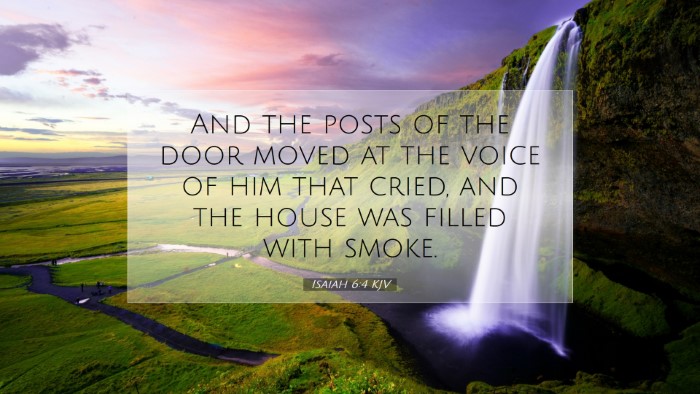Commentary on Isaiah 6:4
Verse Reference: Isaiah 6:4 - "And the posts of the door moved at the voice of him that cried, and the house was filled with smoke."
Introduction
Isaiah 6:4 is a profound verse situated at the beginning of Isaiah's prophetic calling. This moment is characterized by a vision of God in His holiness, underscoring the majesty, power, and atmosphere of divine presence. Within this context, insights from public domain commentaries unveil layers of meaning significant for pastors, students, theologians, and Bible scholars alike.
The Divine Encounter
Matthew Henry emphasizes the extraordinary nature of the divine encounter that Isaiah experiences. The vision of the Lord seated on a throne high and lifted up complements the dramatic impact of the heavenly scene. The movement of the posts at the voice of the seraphim illustrates not only reverence but also the dynamic power of the Lord’s presence.
This encounter marks a pivotal moment where heaven intersects with earth, showcasing God's sovereignty and glory. Albert Barnes notes that the testimony of created beings, such as the seraphim, affirms the holiness of God, which is central to Isaiah's prophetic mission.
Symbolism of the House Filled with Smoke
The overwhelming presence of smoke in Isaiah 6:4 is rich in symbolism. Adam Clarke suggests that smoke represents God’s glory manifesting in a way that is both awe-inspiring and frightening. It conveys the idea of mystery and divine incomprehensibility, pointing to God’s transcendence beyond human understanding.
This celestial smoke parallels the Shekinah glory of God that filled the tabernacle and the temple, highlighting God's presence among His people. The presence of smoke serves to remind believers of their own limitations in approaching a holy God, reinforcing the theme of reverent fear that permeates the biblical narrative.
The Significance of Voice in Worship
In this verse, the voice of the seraphim is a focal point. Henry notes that their proclamation is significant—"Holy, holy, holy, is the Lord of hosts"—which reverberates through the heavens and reverberates in the hearts of worshipers. The voice possesses both authority and power, shaking the foundations of the temple.
Barnes teaches that the true essence of worship begins with understanding God’s holiness. The seraphim’s vocal declarations serve as an invitation for Isaiah and all believers to enter into a deeper relationship with the Almighty. Their worship arises from an accurate understanding of God’s nature, which is fundamental for any effective ministry.
The Impact of Divine Holiness
The term "holy" used thrice in the seraphim's praise denotes complete and utter purity. Clarke points out the literary device of repetition for emphasis, suggesting that God's holiness is not just an attribute but His very essence. This triple repetition draws attention to the sanctified life expected of His followers.
Henry elaborates on the implications of this holiness for Isaiah and his prophetic mission. An encounter with God's holiness compels Isaiah to recognize his own unworthiness, leading to a deep sense of repentance and the need for purification in order to fulfill God’s calling.
Response to Divine Revelation
The profound realization of God’s holiness leads to Isaiah’s inner turmoil. The ensuing response is critical for understanding this passage. Barnes explains that the revelation of God's character, combined with the awareness of human sinfulness, is transformative. For every spiritual leader, understanding the balance between God’s holiness and human frailty is essential for effective ministry.
Clarke alludes to the transformative and humbling aspect of Isaiah’s vision, wherein he declares, "Woe is me!" It is a powerful recognition of personal unworthiness in confronting divine perfection, leading to a place of repentance, which is foundational before one can faithfully serve.
Conclusion
Isaiah 6:4 serves as an essential exploration of divine holiness, worship, and the human condition. The combined insights from Matthew Henry, Albert Barnes, and Adam Clarke deepen our understanding of this verse and its implications for the life of faith. Acknowledging the majesty of God invites us to a transformed perspective, embodying a life that pursues holiness in the context of worship and ministry.
Implications for Ministry
- Understanding the majesty of God shapes our approach to worship.
- Recognizing human frailty prepares us for service.
- Holiness calls for personal and communal repentance.
As we reflect on Isaiah 6:4, may we be compelled to respond with sincerity, leading us into deeper worship and purposeful outreach as we emulate the holiness we encounter in the divine presence.


